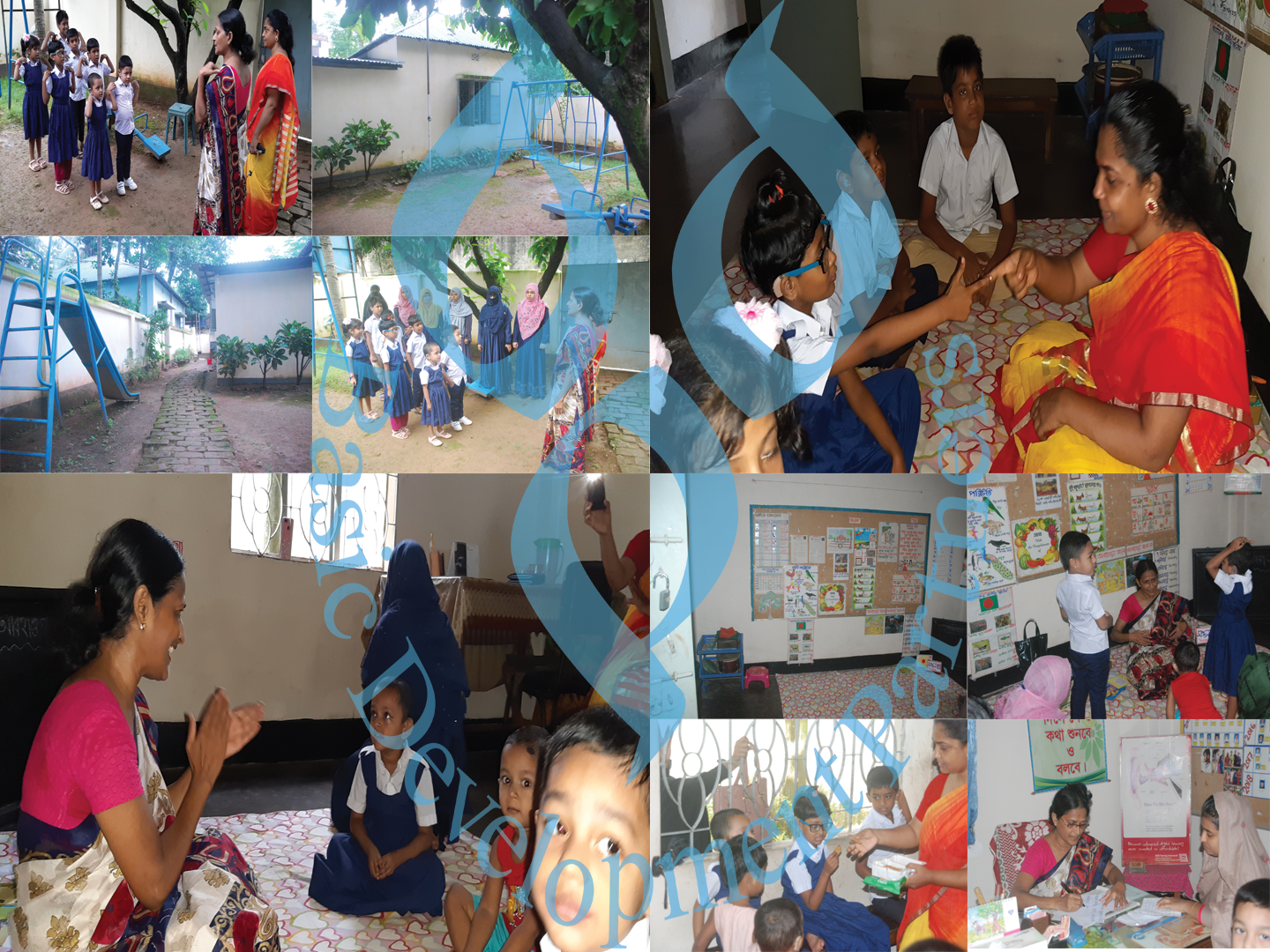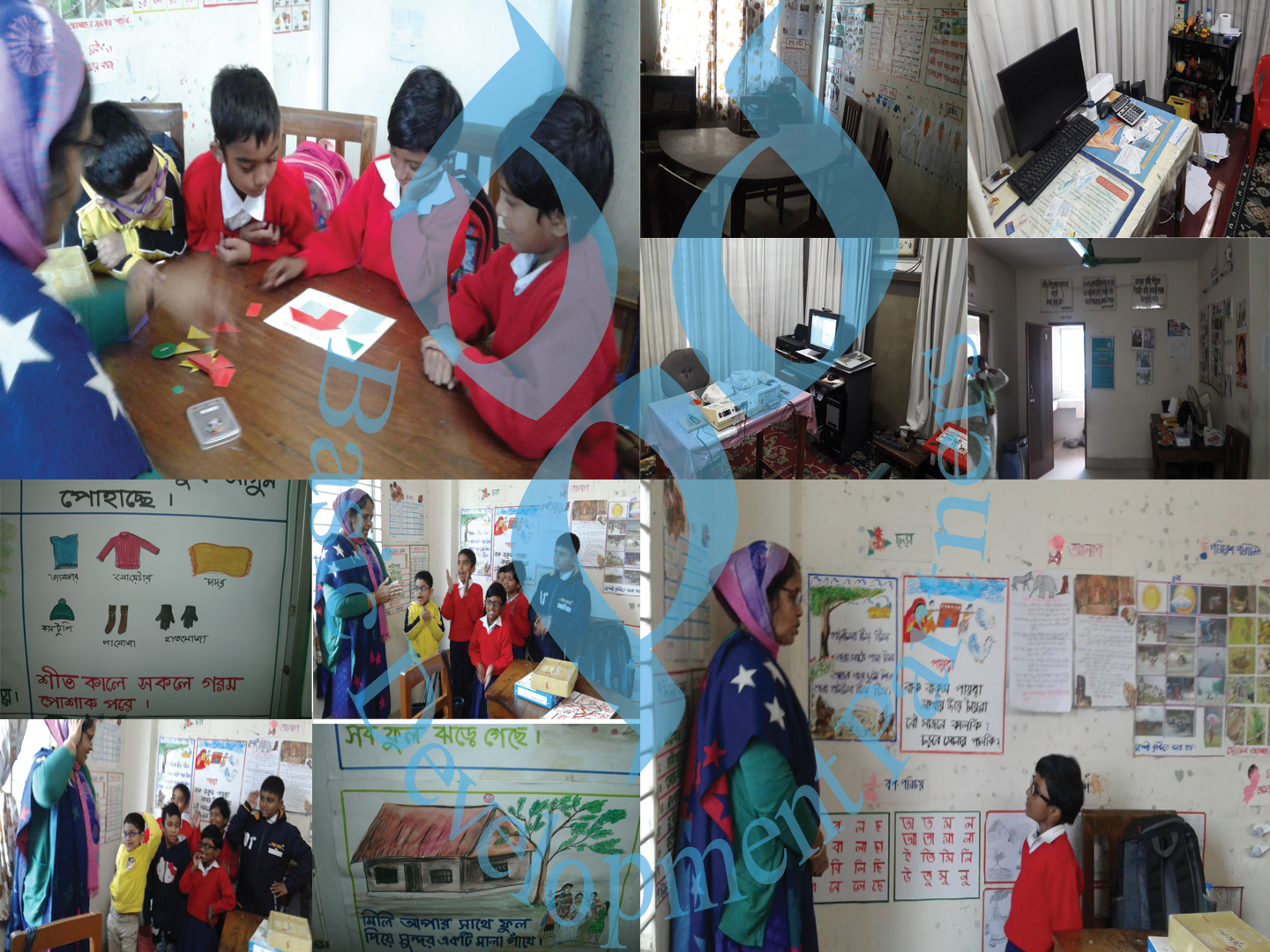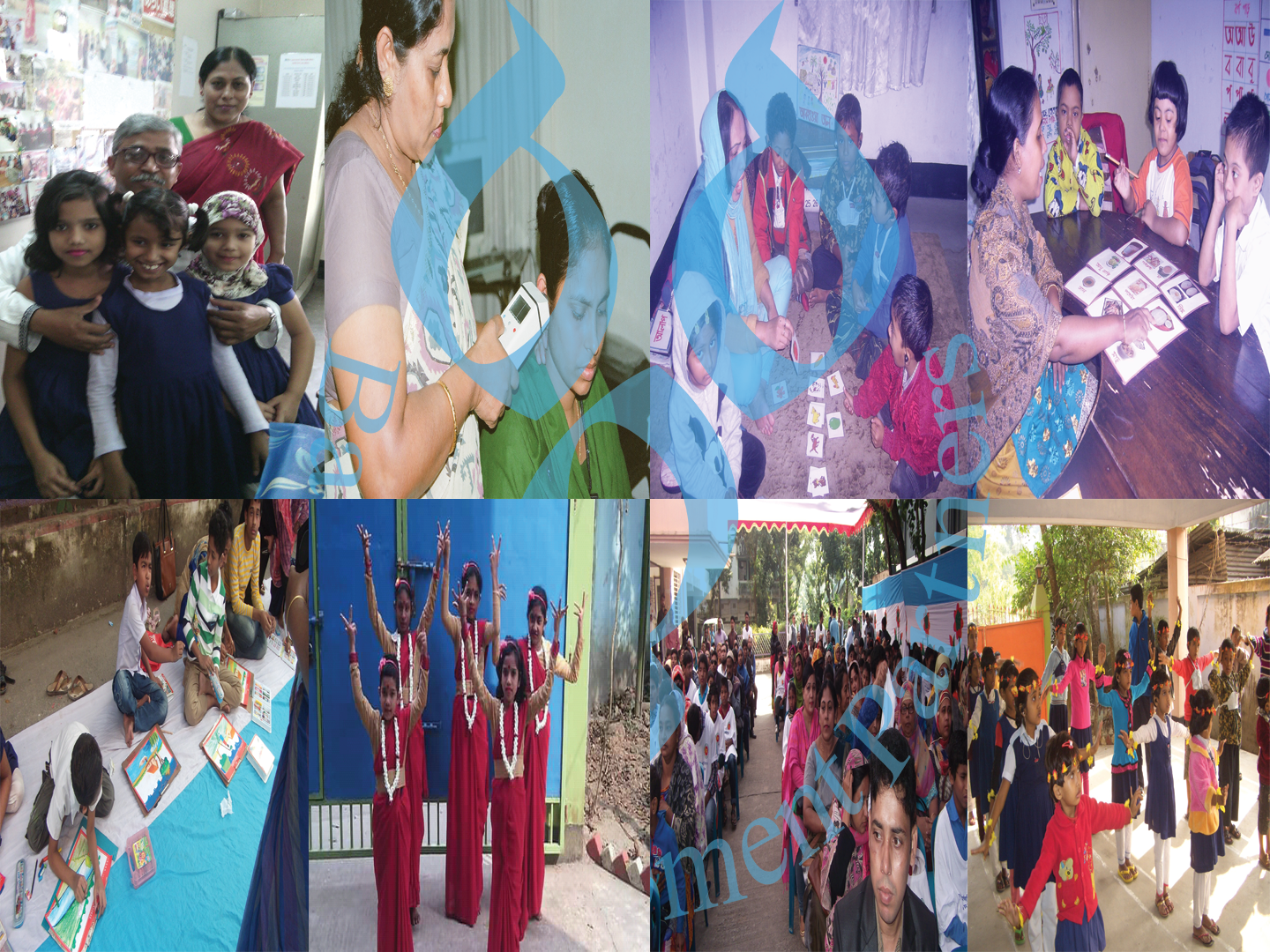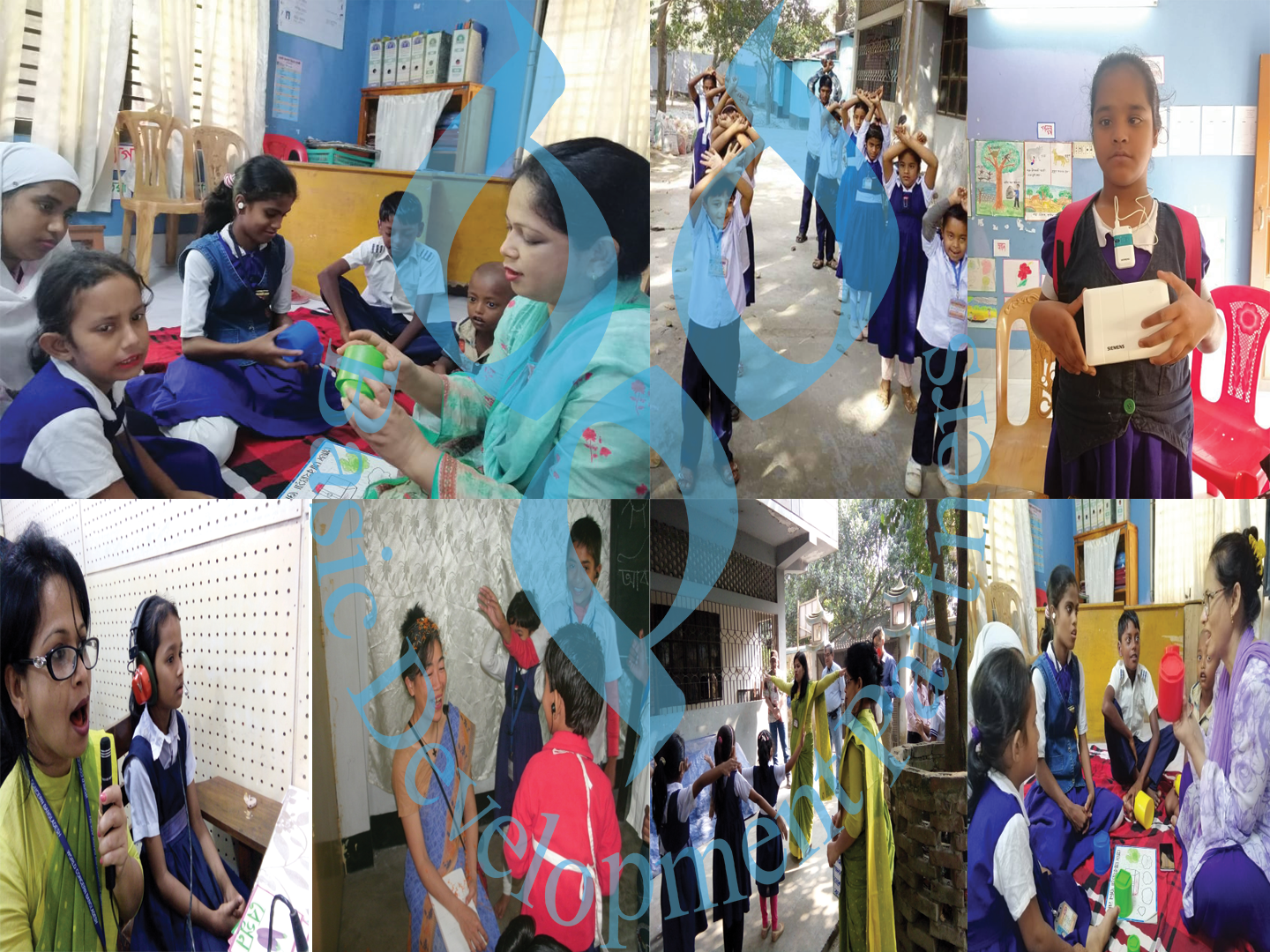Health
Education
Autism &
Rehabilitation
Introduction
In Bangladesh, about 18 million people are estimated to suffer from impairment. However, both the educational and clinical facilities aren't available in the country and are very limited and mostly located in big cities. Therefore, Basic Development Partners (BDP) selected four areas, where there are many impaired people with no services available to them especially with HEARING IMPAIRMENT, DOWN SYNDROME and AUTISTIC. Despite this situation, there exist only a very limited number of facilities for clinical, educational, and social support for impaired people. This is mainly due to various socio-economic constraints in the country.
HEAR (Health Education Autism & Rehabilitation) Program was established in September 1993 with the aims of providing the proper opportunity to the children with hearing impairment, down syndrome and autistic for school education through the auditory-oral method, and at the same time, providing hearing assessment and advice to people with disability through audiology centres. The project also aims at achieving the ultimate goal of a society where disabled and normal children would live together without any discrimination. This is done through integration of impairment children to general school after they develop speech and mind to a reasonable standard by studying BDP HEAR Schools for a few years. However, the project also seeks an impact by reducing the number of people with impairment by providing mass awareness education.
Clinical/Audiological facilities with qualified experts and proper equipment are required to check the hearing loss level, down syndrome and autistic detect to give appropriate advice and to develop hearing ability through proper hearing aids. Again, the number of existing and working clinical/audiological institutes for the impairment in the country is far from satisfactory. There are a few such institutes in Dhaka and some major cities, but almost no clinical/audiological institutes are available for the majority of people living in small cities, towns and villages.
In Bangladesh, three factors are regarded as special causes of impairment. They are malnutrition, marriage between close relatives, and some diseases with a high fever. These are common and can be avoided by some active efforts of society. However, due to lack of awareness on the causes mentioned, appropriate measures are not taken and thus the number of impaired people is still substantially increasing. A teacher can only assist a maximum of 1- 8 students in a class. Teaching more children than this number is not effective and can be very tiresome. Also, the audiology facilities and equipment are quite costly. Therefore, many donors do not feel encouraged to support this kind of project for the long-term. The result is that many impaired children and people are more neglected and suffering from their disability.
SAVAR School

HEAR School Facilities are of:
1. Big playground with equipments for children to have proper physical activity.
2. Experienced and well-trained female teachers & staffs.
3. Environment & methodology created to suit you children needs.
4. Audiology check up facility.
5. Children hearing aid/accessories are available.
Admission / Timing.
Graduating in an average 5/five students yearly. School operates in two shifts morning(8:00am-11:00pm), afternoon(11:30am-02:45pm). Male/Female students with minimum three year compulsary training on special education. Students can apply who are of age minimum 2years / 15years maximum.
Upon Completion.
Upon course completion graduates are evaluated/monitored and helped/encourged to be integrated into formal schooling system.
Program Activities
Each year, 4% of the total students in each HEAR school is integrated into formal schools'. About the home care of their children and they can do so properly at home. The impaired students would receive vocational training on tailoring and computer by a trained and skilled trainer.
The classes, in general, are held 6 days a week for 3.5 hours a day. Infant/nursery class is held 2 days a week for 1.5 hours a day. The class teacher visits each infant's family twice a month. Parents’ sessions are provided to the parents of students who are under 3 years old or in the first year. Separate parents' sessions are held for each class.
Each parent session or class is held once a week for 50 minutes. One special parents’ class is held monthly for all the parents concerned. In April, August and December, examinations are held in each school for students in each class. All the hearing-impaired students use hearing aids for the whole day.
Hearing-impaired children can be found through the effort of increasing the number of patients in the audiology centre. The impaired children found through the hear camp are recommended to enter the HEAR school. In December, advertisements on BDP HEAR school and auditory-oral education is done in the surrounding areas.
Mymensingh School

Barisal School

Hearing-impaired children can be found through the effort of increasing the number of patients in the audiology centre. The impaired children found through the hear camp are recommended to enter the HEAR school. In December, advertisements on BDP HEAR school and auditory-oral education is done in the surrounding areas.
At the end of every December, investigation is held to search for possible students who could be admitted to general schools and if suitable students are found, they will be integrated into general schools.
The general schools, in which the impaired children have been integrated, are visited quarterly by each headmistress, and if she finds that an integrated student could not follow the normal classes properly, she would take the student back to HEAR school.
In January of every year, the teachers of the general schools in which impaired children have been integrated will be invited in the HEAR schools to help them gain a greater understanding on the education of impaired children.
To accomplish the ultimate goal of the society where disabled and non-disabled children will live together without any bias or discrimination, it will be examined if an exchange program, where all the HEAR school students will interact with other normal children, can be successful.
When a student from HEAR school will be found to be suitable for integration in the general school, he or she will move to the general schools for studying with other normal children in the class.
In every December services provided by the HEAR schools and the audiology, centres are advertised in the surrounding areas by hanging posters.
The services offered by the hear schools and audiology centres are advertised through workshops or meetings with local NGOs and associations of NGOs.
When a hear camp is held, it is advertised in the surrounding areas by loudspeaker announcements.
Bhairab School

Partners
HI-CARE (Hearing Center and School), SAHIC (National Hearing Center and School), Salvation Army (Deaf School), Autistic foundation, SWAC, Abid Hearing Instruments ,Ear Care Hearing Center and other resource centers in Bangladesh such as National Forum of Organizations Working with Disabled (NFOWD), Bangladesh Protibondhi Foundation (Foundation for the Developmentally Disabled), Shishu Bikash Network (Child Development Network) etc. In order to remain up to date with necessary information(School admisssion/ Query) related to special education and audio equipment.Please contact to program manager - HEAR: + 880 2 58052026 (Sun - Thursday / 9am - 5pm).